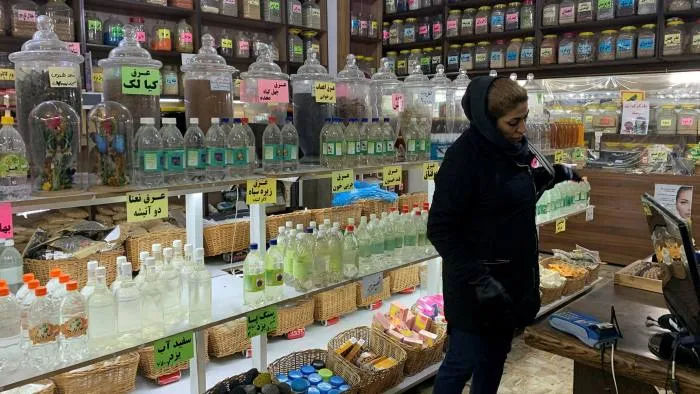
In recent months, as coronavirus has ravaged Iran, more and more people have come to Ahmad Karbalaei’s 200-year-old attari, a shop selling traditional herbal medicine, in search of help.
One of his medicines is named after Imam Kazim, an infallible Imam of Shia Muslims, and is recommended by the clergy. It includes red sugar, mastic and fennel and is mixed with honey before being taken. Another is based on a prescription from Avicenna, a famous Persian physician of the 10th century, and includes sweet violet, horsemint, thyme and maidenhair fern.
“Around 50 people on average come to this shop every day to ask about or buy Imam Kazim drugs. The demand is very high,” said Mr Karbalaei, the owner of the attari. He typically recommends the one based on Avicenna, which he was taught as a treatment for asthma by a 70-year-old patient half a century ago. “Now, I sell it to coronavirus patients.”
More than 54,000 people have died from coronavirus in Iran, making it one of the worst hit countries in the region. President Hassan Rouhani has warned about the difficulty Iran will face in accessing the vaccine. He assured Iranians that his government would procure vaccines from foreign companies and domestically produce them despite the US sanctions, which he said had “brutally” limited the country’s access to medicine under the pandemic.
“We will overcome problems [in importing vaccines] at any price” but “people should know that whatever we do, whenever we want to import medicine, equipment or vaccines, we curse [Donald] Trump,” he said.


One of the world’s oldest medicines, along with Ayurvedic and Chinese treatments, Persian medicine was repressed under the Pahlavi dynasty.
After the 1979 revolution that saw the overthrow of this dynasty and established the theocratic state, the Islamic republic began to encourage traditional medicine more than a decade ago. Medical students were able to specialise in it — once they had received a general medical education — and about 420 traditional physicians are licensed to treat patients.
“Traditional medicine is deeply rooted in our culture as we are given herbal medicine from childhood by our parents alongside chemical drugs,” said Dr Roja Rahimi, vice-dean for research affairs of the School of Persian Medicine affiliated to the Tehran University of Medical Sciences.
Persian medicine centres on creating an internal balance by pairing “warm” and “cold” ingredients. Lamb, considered warm, is recommended to prevent a deadly virus that is believed to survive longer in cold environments. Sales of warm herbs such as those of the mint family have also increased.
But the popularity of these medicines proved contentious early on in the pandemic when Abbas Tabrizian, a cleric, said sweet violet oil could cure Covid-19. He set fire to Harrison’s Principles of Internal Medicine, an American textbook, prompting uproar across Iran.
“This approach is thorough fanaticism by which everything is linked to Islam and the Imams,” said Nasrin, a 55-year-old retiree. “What this man said about sweet violet oil was absolutely ridiculous but what he did to Harrison’s book was utterly outrageous.”


Fatemeh, a 47-year-old nurse from Tehran said her religious husband only took a sip of Imam Kazim medicine when he was infected with coronavirus. “But almost immediately he got a rash all over his body,” she said.
Still there are many who swear by the treatment. One cleric in the holy city of Qom said traditional medicine had cured him. “Modern medicine has no solution for coronavirus but this drug has so far proved the best and saved me and many other people,” he said.
Health authorities have made clear they do not recognise what the clergy calls Islamic medicine, resisting moves by some clergy to treat patients. Kianush Jahanpur, the health ministry’s head of public relations, said “folklore medicine” and “superstitions” would not be acceptable.
“The school of Persian medicine has more than 3,000 years of history,” he said. “While the health ministry will resist radical behaviour, we recognise the cultural and scientific heritage as an invaluable asset and will help its development.”
At the School of Persian Medicine, there is a lot of hope in the future. “The future belongs to integrative medicine by which students go to medical schools and learn modern medicine while developing their knowledge about classic medicine whether Persian, Chinese or Indian,” said Dr Mehrdad Karimi, vice-dean for international affairs of the centre. “This is only the beginning.”




















